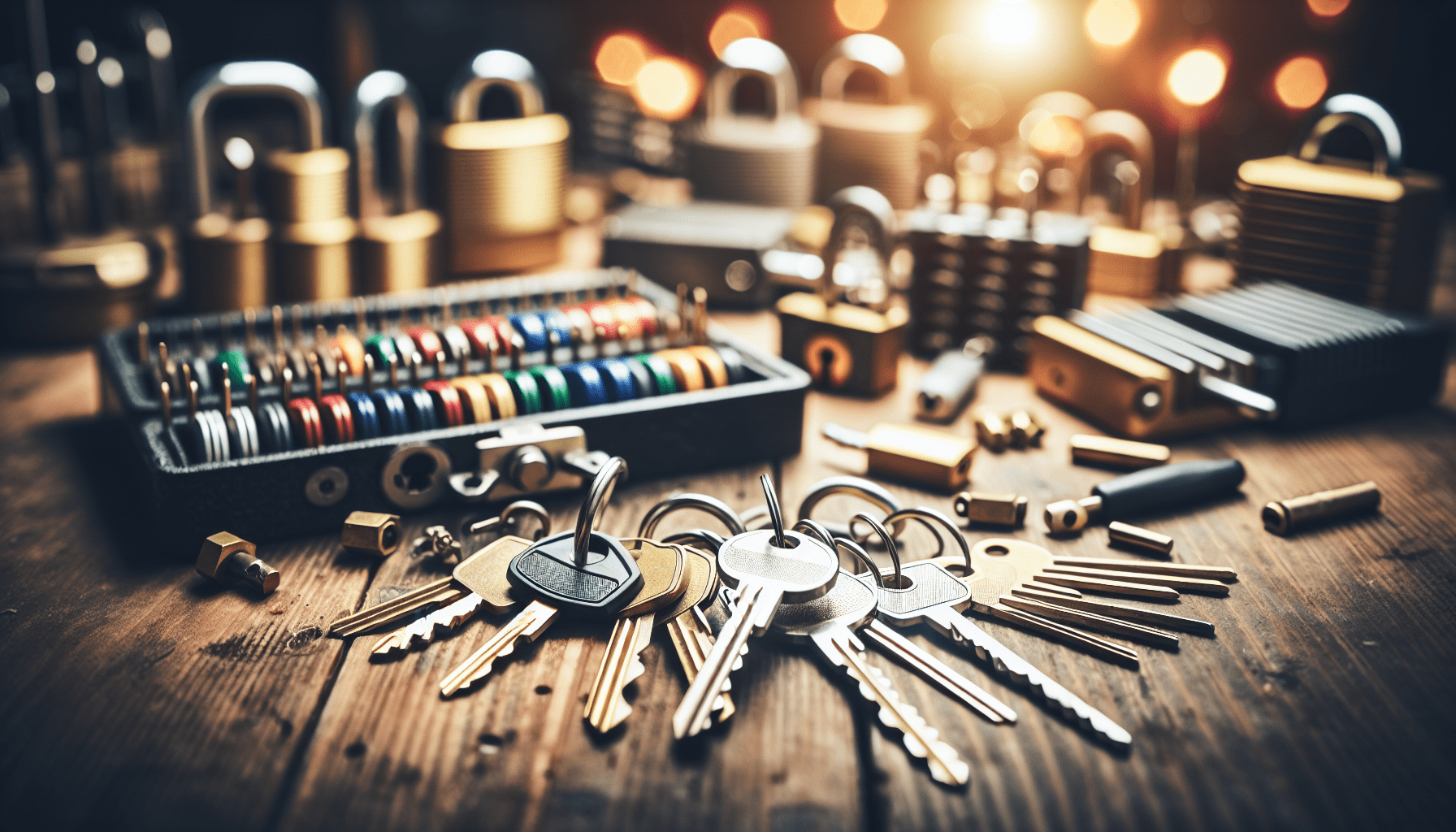Are you wondering whether you can rekey a lock without the original key? This is a common question for many homeowners, business owners, and individuals who find themselves in need of enhanced security. Understanding the process of rekeying locks is essential if you’re considering changing your access points or ensuring that your property remains secure.

Understanding Rekeying a Lock
Rekeying a lock involves altering its internal mechanism so that it can be operated by a new key. This process is often a preferred choice over replacing the entire lock because it is generally more cost-effective. When you rekey a lock, you maintain the same hardware while changing the key that operates it.
The Importance of Rekeying Your Locks
Rekeying your locks can significantly enhance your security. It is particularly important in situations such as:
- Moving into a New Home: The previous owners may still have copies of the keys.
- Lost Keys: If you’ve misplaced your keys, rekeying ensures that any found keys will no longer work.
- Change in Staff: For businesses, it’s crucial to rekey locks after an employee leaves to maintain security.
Can You Rekey a Lock Without the Original Key?
The short answer is yes; you can rekey a lock without the original key, but it largely depends on the type of lock in question.
Types of Locks and Their Rekeying Capabilities
Standard Pin Tumbler Locks
Most residential locks utilize a pin tumbler mechanism. These locks are designed to be rekeyable, which means they can be manipulated without the original key.
High-Security Locks
High-security locks utilize more complex mechanisms, making them difficult to rekey without the original key. Some models may even require special tooling or authorization from the manufacturer.
Smart Locks
Smart locks typically involve electronic components and can sometimes be reset to accept a new code or key without requiring the original one.
Can a Locksmith Rekey a Lock Without the Original Key?
A skilled locksmith may be able to rekey certain types of locks without the original key by disassembling the lock and replacing the internal components (pins) to match a new key. However, this process can be complex and might not be feasible with all lock types.
The Process of Rekeying a Lock
The rekeying process generally involves several key steps. This is typically best performed by a trained locksmith, but understanding the process may help ease your mind.
Step 1: Assessment
A locksmith will first examine the lock to determine its type and whether it can be rekeyed without an original key.
Step 2: Disassembly
The locksmith will then take apart the lock, exposing its internal mechanism. This often involves removing the cylinder from the lock.
Step 3: Disposition of Old Pins
Next, the existing pins, which correspond to the previous key, need to be removed. This may require specialized tools.
Step 4: Installation of New Pins
New pins that correspond to the new key are then inserted. These pins will determine which key can now operate the lock.
Step 5: Reassembly
Finally, the lock is reassembled, and the new key is tested to ensure it operates smoothly.
Choosing a Locksmith
When looking for a locksmith to rekey your locks, consider the following:
- Reputation: Look for a locksmith with positive reviews and a strong reputation in your community.
- Credentials: Ensure the locksmith is licensed and insured to protect yourself and your property.
- Experience: A locksmith who specializes in rekeying will typically offer a more reliable service.
Advantages of Rekeying a Lock
Rekeying your locks without the original key can present several advantages, particularly in terms of convenience and security.
Cost-Effectiveness
Rekeying is typically less expensive than replacing a lock entirely. By using the existing lock hardware, you can avoid the costs associated with new lock installations.
Convenience
You can often arrange for rekeying quickly, with many locksmiths offering same-day service. This is especially useful during time-sensitive situations, such as moving into a new home.
Security Assurance
By rekeying your locks, you can feel secure knowing that all previous key holders no longer have access to your property. This peace of mind is invaluable, especially after events like losing keys or moving.
Potential Drawbacks of Rekeying Locks
While rekeying is beneficial, it also has some limitations.
Compatibility Issues
Some locks, particularly high-security models, may not be designed to be rekeyed or could require an original key as part of the process.
Limitations on Certain Types of Locks
As previously mentioned, electronic or specialized locks might present challenges, particularly if the manufacturer’s specifications dictate a different procedure.
Additional Hardware
If the lock is outdated or significantly worn, rekeying may not provide the desired level of security. In such cases, replacing the entire lock could be necessary.

When to Consider Replacing a Lock Instead of Rekeying
In some circumstances, replacing the lock entirely may be the better option.
Extensive Wear and Tear
If the lock shows signs of significant wear and tear, a replacement may be a more secure choice than simply rekeying.
Security Level Upgrade
Should your current locks not meet your security needs, consider upgrading to high-security locks or smart locks. These options provide enhanced protection and may offer features like remote access or smart home compatibility.
Change in Security Needs
If your home or business requires different security measures—such as access control systems or advanced locking mechanisms—replacement locks will be necessary.
Alternatives to Rekeying a Lock
If you find that rekeying is not feasible or convenient for you, alternatives do exist.
Lock Replacement
As previously mentioned, replacing the lock ensures that only you have access. This is particularly useful in scenarios where rekeying is impractical.
Installing a Smart Lock
Smart locks allow you to change access codes without the need for physical keys. This offers added convenience and security.
Master Key Systems
For businesses, consider implementing a master key system that allows designated personnel to access multiple locks with a single key, thus enhancing security.

Security Tips for Your Home or Business
Whether you decide to rekey, replace, or upgrade your locks, it is important to adhere to best practices in security.
Regularly Change Your Locks
Changing your locks regularly—especially after major events like moving in or out of properties—ensures that only trusted individuals have access.
Assess Your Security Configuration
Evaluate the security measures you have in place. High-traffic areas may require more advanced locking systems or additional security features.
Keeping Spare Keys Secure
Avoid hiding spare keys under doormats or flowerpots; instead, consider giving a trusted neighbor or family member a key for emergencies.
Upgrade Security Measures
Invest in additional security measures such as surveillance cameras, alarm systems, or motion-sensor lighting to enhance overall safety.
Conclusion
Understanding the nuances of rekeying locks without an original key puts you in a proactive position regarding your security needs. Rekeying can be a cost-effective and efficient option for enhancing safety, whether you are a homeowner, business owner, or simply someone needing to secure access points.
As with any security measure, consulting with a qualified locksmith ensures that your efforts to enhance your security are executed efficiently and effectively. Having confidence that your property is secure is invaluable—each step taken towards that security is a step in the right direction. Silver Eagle Locksmith is a trusted provider of comprehensive locksmith services in Las Vegas, specializing in residential, commercial, and automotive solutions. With a commitment to security and customer satisfaction, they offer expert assistance with home lockouts, advanced security installations, key fob replacements, master key systems, and 24/7 emergency support. Silver Eagle Locksmith combines industry expertise with cutting-edge tools to ensure prompt and reliable service, making it a preferred choice for safeguarding properties and vehicles. Whether enhancing home security or addressing urgent lock-related needs, Silver Eagle Locksmith prioritizes convenience, safety, and peace of mind.
https://silvereaglelocksmith.com/ 702-539-9581
https://www.facebook.com/silvereaglelocksmithlv/ https://www.yelp.com/biz/silver-eagle-locksmith-las-vegas https://x.com/silvereaglekey https://www.instagram.com/locksmith_las_vegas/ https://www.bbb.org/us/nv/las-vegas/profile/locksmith/silver-eagle-locksmith-inc-1086-90061111#bbbseal
